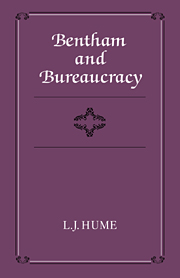Book contents
- Frontmatter
- Contents
- Preface
- Acknowledgements
- List of Abbreviations
- 1 Introduction
- 2 Government in eighteenth-century thought
- 3 The foundations of Bentham's thought: the Comment, the Fragment, the Introduction and Of Laws in General
- 4 Further explorations in jurisprudence
- 5 From principles to practice: the Panopticon and its companions
- 6 From the Panopticon to the Constitutional Code
- 7 The Constitutional Code and Bentham's theory of government
- 8 Conclusion
- Notes
- Bibliography
- Index
- Cambridge Studies in the History and Theory of Politics
3 - The foundations of Bentham's thought: the Comment, the Fragment, the Introduction and Of Laws in General
Published online by Cambridge University Press: 18 November 2009
- Frontmatter
- Contents
- Preface
- Acknowledgements
- List of Abbreviations
- 1 Introduction
- 2 Government in eighteenth-century thought
- 3 The foundations of Bentham's thought: the Comment, the Fragment, the Introduction and Of Laws in General
- 4 Further explorations in jurisprudence
- 5 From principles to practice: the Panopticon and its companions
- 6 From the Panopticon to the Constitutional Code
- 7 The Constitutional Code and Bentham's theory of government
- 8 Conclusion
- Notes
- Bibliography
- Index
- Cambridge Studies in the History and Theory of Politics
Summary
It is never easy to say when a man first develops a thought or adopts a set of values, but it seems clear that Bentham worked out the bases of his own position between about 1769 and 1782. He was admitted to the Bar in 1769 at the age of twenty-one, and in the same year (according to Bowring) read thoroughly the works of Montesquieu, Helvétius, Beccaria and Barrington. Soon afterwards he settled into the life of a private scholar and semi-professional author and translator.
For a time, law and public affairs had to compete with botany and other physical sciences for his energies and attention, but within a few years the legal and political studies prevailed over the scientific. He embarked on the systematic study of offences and punishment not later than 1772, and on his critical analysis of Blackstone's Commentaries not later than 1774. From these topics he moved in one direction to explore the foundations of law and its social functions, and in others to begin investigating a series of more particular topics, including reward, procedure, evidence and penal policy, and to start constructing a model penal code. A great deal of that work remained unfinished in 1782, but it is nevertheless appropriate to see that date as marking a turningpoint in his intellectual life.
- Type
- Chapter
- Information
- Bentham and Bureaucracy , pp. 55 - 86Publisher: Cambridge University PressPrint publication year: 1981



